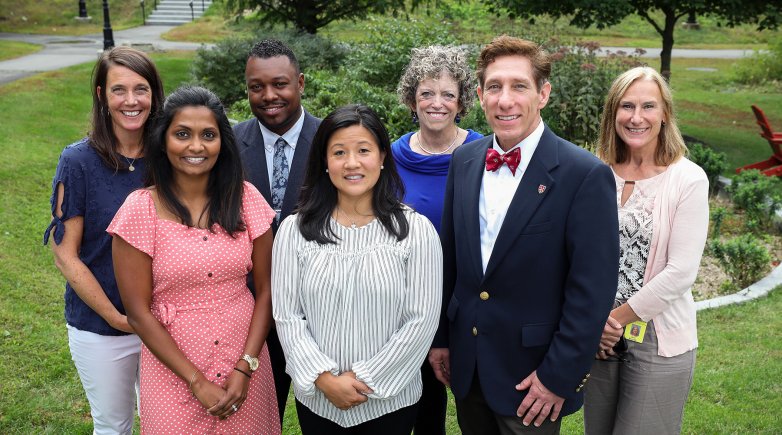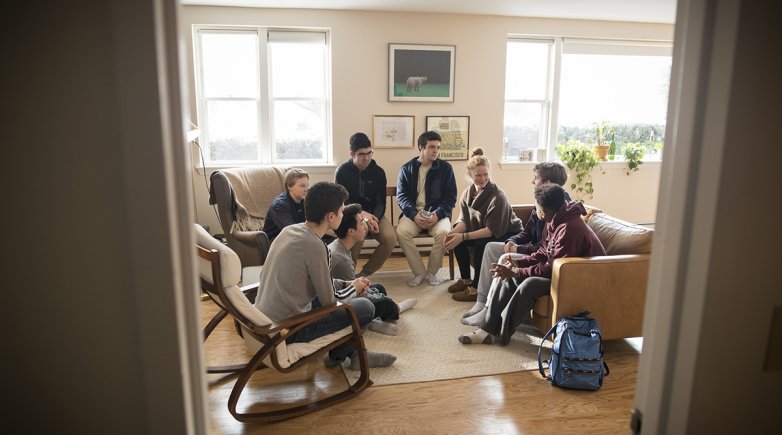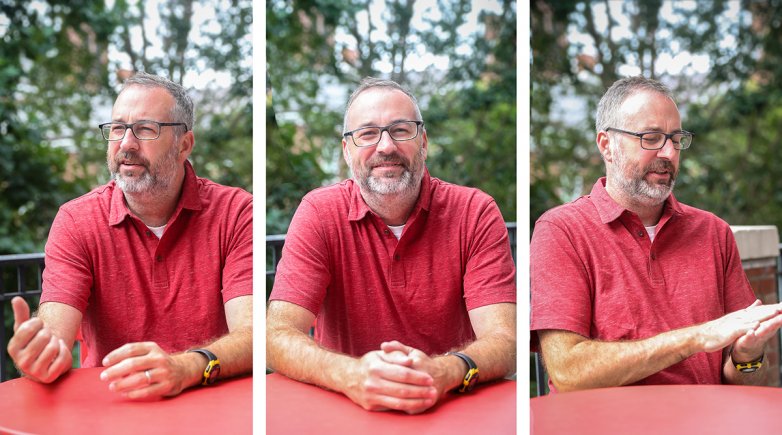A conversation with Director of Counseling Szu-Hui Lee
Exeter's Counseling and Psychological Services team evolves to best support our students.
Szu-Hui Lee (center) and her Counseling and Psychological Services team outside the Lamont Health and Wellness Center.
Everyone can use a bit of support, it’s just a natural part of growing up. Exeter’s Director of Counseling Szu-Hui Lee wants to make sure every student learns how to ask for it. “It’s really a life skill to know how to get help for yourself, how to pick up that phone and how to look for resources,” Lee says.
As a board-certified clinical psychologist who specializes in the treatment of anxiety disorders, cross-cultural adjustment, issues of first-generation students, identity development and relationships, Lee brings a deep understanding of adolescence to the table. We caught up with her, just as she completed her first year as director of the counseling department, to learn more about what her team does in the community and the importance of teaching students to talk about their feelings.
Q: What are some of the things you help with at the start of the school year?
Lee: When a student comes to campus for the very first time, there is a lot to adjust to. First time being away from home, having to make new friends, getting used to a new environment, it’s normal to be anxious. They might ask themselves, “Do I belong?” and “Do I have what it takes to be here?” Or they might miss their mom and dad and friends from home. I say, let’s talk about it. Let us teach you ways to not only set in place connections back home, but also how to adjust to your new home away from home. Let us help you learn ways to approach the dining hall, to engage with your teachers and classmates in class, or how to practice healthy self-care habits like sleeping, eating and exercising. Adjustment is a process but before you know it, you’ll find your groove at PEA.
Q: You just named all of the things that every teenager everywhere wrestles with.
Lee: Yes, it’s just a part of growing up. These are a very developmentally appropriate questions and life skills to obtain. “Who am I?” Who am I in relation to my parents, to my peers, to the person I aspire to be. Our hope is that after talking with us they’re standing stronger and taller and having a firmer sense of who they are, of all of their identities, and of how they’re going to walk in the world. That’s what counselors try to help with — that journey of finding and being in touch with our authentic selves.
Q: How has the counseling department changed since you started here in 2014?
Lee: I think the counseling department has been very intentional about evolving and growing right along with the PEA community at large. As the school is increasing its attention on mental health and wellness of the whole child, as the students are asking for more support, we were very quick to respond to that. Students wanted more diversity within the counseling staff. Students wanted more choices. Our team grew from three to now five full-time counselors within just a few years. We now represent a variety of identities and a solid foundation of clinical expertise. Similarly, adults were asking for more support and more resources and more programming so with increased staffing we’re able to provide more outreaches services.
Q: When do you first introduce the counseling team to students?
Lee: We get in front of students the minute school starts. We participate in the International Student Orientation Program, new student orientation, and we meet all new students in their Health Education classes. We are there introducing ourselves and informing students about who we are and our services. Then we make sure that we are in front of the students at different points throughout the year when they might need extra support.
Q: Do lots of students take advantage of your services?
Lee: Yes, we see about a third of the students at PEA and demands for our services have been on a steady increase the last five years. In collaboration with all the members of our community — the students and the adults — we have really fought hard to de-stigmatize mental health and make seeking a counselor is something that you do as part of preventative and healthy self-care, not just crisis intervention. It’s wonderful that we’re seeing more people coming forward and saying, ‘Gosh, can I talk about this with you?
Q: What are some examples of self-care skills you help with?
Lee: We want students to learn lots of good life skills at this stage of their lives. Things like, ‘How do I manage my emotions? How do I navigate peer relationships? How do I shift the way I talk to my parents now that I’m more of a young adult and not a kid?’
Q: Do they learn these things through individual sessions or in groups?
Lee: We do both. We offer one-on-one individual psychotherapy sessions where students will meet with a counselor typically once a week or every other week. There are also students that meet with a counselor at the beginning of the term, the middle of the term and at the end of the term. Those are more like check-ins. Some kids will also just come in with a particular issue in mind and once that issue is resolved, we don’t see them again until perhaps they want to meet again. No matter the frequency, students know they can come meet with us and we will help them with whatever may be going on. We also offer different skills based workshops on campus and our support groups are in development.
Q: How do the group sessions work?
Lee: We offer lots of different workshops on campus. I’ve done a five-week group workshop on perfectionism and how to manage that, for example. I’ve also done a workshop on anxiety management and a group for those who identify as female that speaks to issues of women empowerment, loving our body and positive self-talk. This was in collaboration with faculty members Ms. Lim and Ms. Marshall. Dr. Chris Thurber has run workshops on homesickness and Ms. Connie Morse has led mindfulness workshops. We do these time-limited workshops throughout the year to, again, make sure the kids can have access to us outside of individual therapy sessions. We also do outreaches in the community. We recently launched a new program where counselors are working with dorm faculty to support them with the great work they do with students in their dorms.
Q: What about privacy?
Lee: All of our services are confidential and private. It is really important that students have a safe place that they can go to on campus, we are glad to be one of those spaces. We go over confidentiality with students when they first begin their work with us. We remind students that we are able to keep all contents private unless there are risks of harm involved. If safety of a student is in question, we obviously would need to involve other adults. Other than safety concerns, students really can utilize our time together to discuss whatever may be on their minds.
Q: How large is your team?
Lee: Our department size is comparable to, if not better than, most of our sister schools. There are five of us who work fulltime and we also have one psychiatrist and one psychiatric nurse practitioner — Marina Vijayakanthan and Jean Banville — who come in one day a week to provide psychiatric evaluations and medication management. We are really proud of our team and the comprehensive services we are able to provide out of Lamont Health & Wellness Center.
Q: How long does a student have to wait to get the care they need?
Lee: One of the reasons that our team has grown is because the demand is there. We want to make sure students have access to a counselor as soon as they need the support. In the outside world, it might take a month or two before one can schedule an appointment with a therapist and even longer to see a provider for psychiatric evaluation. Here at Exeter a student can be seen usually within a week and certainly if there’s an emergency, we can get people in the same day
Q: You’ve added new faces to the department, Marco Thompson and Johanna Mautz. What are you looking for when hiring a new team member?
Lee: We are so thrilled Mr. Thompson and Mrs. Mautz joined our team. When we hire, we always look for strong clinicians who are experts in providing evidence based treatment and who share the passion for working with adolescents. We were also very intentional about listening to what the students were asking for – to see themselves reflected in those who help them. Students really wanted to have options and choices when it comes to counselors. I was the first person of color in this department when I started in 2014. When I was hired, the school was very intentional about having more diversity on the staff to better reflect the student body. It wasn’t just to check the box of this is a person of color, but this is a person who’s interested and trained and well-versed in areas of diversity and multiculturalism. And our effort continued. I’m very proud to say that in our team, there is diversity that are represented by identities of race, sex, culture, gender, religious affiliations, to just name a few.
Q: How do students get matched with a counselor?
Lee: All of us are trained as generalists and are all able to provide evidence-based treatments to address adolescent mental health concerns. And each of us also has areas of special interest and our own styles of working with students. I’m really interested in anxiety and anxiety disorders; Marco is trained in drug and alcohol counseling; Chris specializes in adjustment and homesickness; Connie is really great at mindfulness and meditation. Jo is wonderful with family and relationships. Everything depends on what the student’s preferences are and sometimes it also comes down to scheduling. And with our team, we can offer lots of choices. And with our team, you can be certain that whoever you work with will provide you with top-notch counseling support. I should also say students are free to switch counselors during their time at PEA. It’s all about fit so perhaps students’ preferences change and that is totally fine.
Q: Do you work with other departments on campus?
Lee: We at Lamont Health & Wellness Center really believe in the integration of mental, emotional, physical health and health of the whole child. We work closely with the medical team, dietitian, and athletic training to make sure we are supporting the various needs of a student at any one time. We also work closely with Health Education & Human Development Department because their curriculum is about the health and wellness. We meet regularly with these various departments and groups to discuss campus wide initiatives, address trends we might be seeing, and also how to support individual students. We also work with deans, dorms, academic departments, and individual advisors whenever necessary as we all share the mission of supporting students.
There’s a team of us, eager and happy to help, and we’re all in the business of helping young people thrive. We often say, we can’t do this work alone, and at PEA, we don’t have to. And that feels really, really nice.


